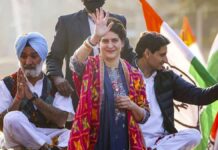Thiruvananthapuram: Despite political assertions and ideological grandstanding, the 24th Party Congress of the Communist Party of India (Marxist), which concluded in Madurai, Tamil Nadu, on Sunday, has left little impact on the landscape of India’s highly polarised national politics.
The triennial national meet elected senior Kerala leader M.A. Baby as the new General Secretary. The newly-formed Central Committee—CPI(M)’s highest decision-making body—includes a mix of fresh faces and seasoned leaders. Several veterans were left out due to the enforcement of the party’s age cap of 75, with the notable exception of Kerala Chief Minister Pinarayi Vijayan. He was the only leader retained in the Politburo, thanks to a special exemption.
While delegates from all states participated, representation from traditional Left strongholds—Kerala, West Bengal, Tripura, and Tamil Nadu—dominated. As always, the delegates were chosen through an internal process beginning at the grassroots level, reflecting the party’s continued adherence to “democratic centralism,” a principle rooted in the era of the Communist International.
The Congress opened with the presentation of the draft political resolution by outgoing central coordinator Prakash Karat. This document, outlining the party’s political and tactical directions, formed the basis of deliberations over four days and was ultimately adopted with a few amendments and dissenting notes.
But beyond the procedural formalities, the larger question remains: did the party congress offer any coherent or pragmatic strategies to position CPI(M) as a credible force in national politics? The answer appears to be no.
The resolution itself conceded that “a key concern prevailing now within the party is that we have not been growing as we should, not increasing our independent strength.” Despite a declared emphasis on street struggles over electoral victories, this is an implicit acknowledgment of the party’s shrinking influence, especially in its former bastions of West Bengal and Tripura.
The document stressed the need to reinforce economic struggles with sustained political and ideological efforts to counter what it called the “Hindutva-corporate nexus.” However, this largely echoed familiar rhetoric, offering little in terms of a concrete roadmap to widen the party’s appeal or electoral base.
CPI(M) continues to be caught in a strategic dilemma within the national opposition landscape. While it aligns with the Congress-led I.N.D.I.A bloc to challenge the BJP at the Centre, it simultaneously adopts a fierce anti-Congress stance in Kerala—the only state where the party remains electorally relevant.
The selection of M.A. Baby as General Secretary underscores the party’s unwillingness to take risks or venture into new political territory. Some delegates had proposed Ashok Dhawale from Maharashtra—a prominent figure in farmers’ and workers’ movements—as a candidate. However, his bid failed to gain traction, especially among the powerful Kerala contingent, which threw its weight behind Baby.
A soft-spoken and non-controversial leader, Baby has remained largely absent from agitational politics in recent years. A former Education and Culture Minister in Kerala and a Rajya Sabha member, he hails from a backward class Christian community. His appointment signals continuity rather than change, reflecting the party’s comfort in maintaining status quo, especially as it clings to power in Kerala.
As such, the Madurai congress has done little to suggest that CPI(M) is preparing to reinvent itself or expand its national footprint. The biggest challenge now lies ahead—retaining power in Kerala, where assembly elections are just a year away.







A well-articulated and balanced analysis. It’s refreshing to see political commentary that informs rather than inflames.
Quality content is the crucial to attract the viewers to go to see the site, that’s what this web site is providing.
Here is my web page :: nordvpn coupons inspiresensation
clomid at clicks buying cheap clomiphene price buying clomid without dr prescription can i order clomiphene pills where can i get clomid clomid tablet price where buy clomid without prescription
The thoroughness in this piece is noteworthy.
Greetings! Utter useful par‘nesis within this article! It’s the crumb changes which will obtain the largest changes. Thanks a lot quest of sharing!
azithromycin 500mg sale – buy tindamax 500mg pills generic metronidazole 400mg
rybelsus 14mg canada – order generic semaglutide 14mg buy cyproheptadine 4 mg pills
motilium 10mg without prescription – domperidone 10mg price cyclobenzaprine price
inderal 20mg drug – inderal brand order methotrexate 5mg for sale
order amoxiclav generic – atbio info buy acillin sale
nexium over the counter – https://anexamate.com/ purchase nexium without prescription
order coumadin 5mg for sale – anticoagulant order losartan pill
What’s up everyone, it’s my first go to see at this web
page, and article is truly fruitful in support of me, keep
up posting such articles or reviews.
Feel free to surf to my page – eharmony special coupon code 2025
purchase mobic generic – swelling mobic price
prednisone 10mg drug – corticosteroid deltasone 5mg ca
I am sure this article has touched all the
internet viewers, its really really fastidious paragraph on building up new blog.
Also visit my web page vpn
purchase amoxil pill – https://combamoxi.com/ amoxil cost
fluconazole drug – https://gpdifluca.com/ order diflucan without prescription
cenforce pills – fast cenforce rs buy cenforce without a prescription
mambo 36 tadalafil 20 mg – https://ciltadgn.com/ where to buy generic cialis ?
generic zantac 300mg – https://aranitidine.com/# order zantac 150mg pills
generic tadalafil tablet or pill photo or shape – strong tadafl buying cialis without prescription
This website really has all of the information and facts I needed to this case and didn’t identify who to ask. click
order viagra india online – https://strongvpls.com/# viagra sale melbourne
I couldn’t resist commenting. Adequately written! https://ursxdol.com/prednisone-5mg-tablets/
More articles like this would make the blogosphere richer. https://buyfastonl.com/amoxicillin.html
It’s very trouble-free to find out any topic on web
as compared to books, as I found this post
at this web site. https://tinyurl.com/28wjzmw4 gamefly 3 month free trial
The thoroughness in this break down is noteworthy. this
Hey just wanted to give you a quick heads up. The words in your article
seem to be running off the screen in Safari. I’m not sure if this is a formatting issue or something to do with
browser compatibility but I figured I’d post to let you know.
The style and design look great though! Hope you get the problem fixed soon. Many thanks https://tinyurl.com/2atd6fak what is a
vpn meaning
This is the stripe of serenity I take advantage of reading. https://ondactone.com/product/domperidone/
Hi there would you mind letting me know which hosting
company you’re using? I’ve loaded your blog in 3
completely different web browsers and I must say this blog loads a lot quicker then most.
Can you suggest a good web hosting provider at a honest price?
Thank you, I appreciate it!
More posts like this would persuade the online play more useful.
where can i buy ozobax
Actually no matter if someone doesn’t understand after that its up
to other viewers that they will help, so here it occurs.
Greetings! Jolly serviceable recommendation within this article! It’s the crumb changes which choice espy the largest changes. Thanks a quantity for sharing! http://images.google.bs/url?q=https://wakelet.com/wake/Ygm_w25-9BwVAfPHOoN7B
More posts like this would prosper the blogosphere more useful. http://www.01.com.hk/member.php?Action=viewprofile&username=Ibgdrq
buy forxiga 10mg for sale – dapagliflozin 10mg pill buy dapagliflozin 10mg without prescription
buy xenical without a prescription – https://asacostat.com/ generic orlistat 60mg
I am in point of fact happy to gleam at this blog posts which consists of tons of of use facts, thanks representing providing such data. http://seafishzone.com/home.php?mod=space&uid=2330949
bookmarked!!, I really like your site!
Take a look at my blog – https://tinyurl.com/mwrcx7hb
You can shelter yourself and your family by being heedful when buying panacea online. Some druggist’s websites control legally and offer convenience, secretiveness, cost savings and safeguards for purchasing medicines. buy in TerbinaPharmacy https://terbinafines.com/product/cipro.html cipro
I am in truth happy to glitter at this blog posts which consists of tons of useful facts, thanks towards providing such data. purchase amoxicillin generic
I’ll certainly bring back to read more.
Với giao diện mượt mà và ưu đãi hấp dẫn, MM88 là lựa chọn lý tưởng cho các tín đồ giải trí trực tuyến.
Khám phá thế giới giải trí trực tuyến đỉnh cao tại MM88, nơi mang đến những trải nghiệm cá cược thể thao và casino sống động.
Với giao diện mượt mà và ưu đãi hấp dẫn, MM88 là lựa chọn lý tưởng cho các tín đồ giải trí trực tuyến.
Tham gia cộng đồng game thủ tại Go88 để trải nghiệm các trò chơi bài, poker phổ biến nhất hiện nay.
Today, I went to the beach with my kids. I found a sea shell and gave it to my 4 year
old daughter and said “You can hear the ocean if you put this to your ear.” She put the shell
to her ear and screamed. There was a hermit crab inside and it pinched
her ear. She never wants to go back! LoL I know this is completely off
topic but I had to tell someone! vpn https://www.highlandguides.com